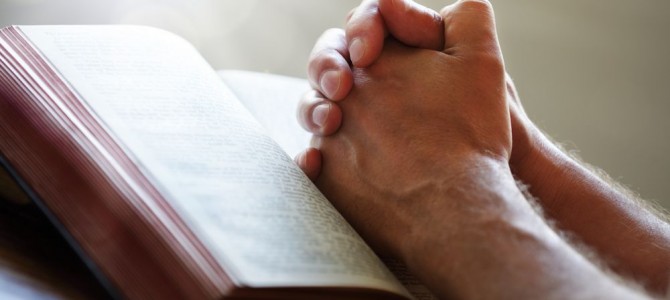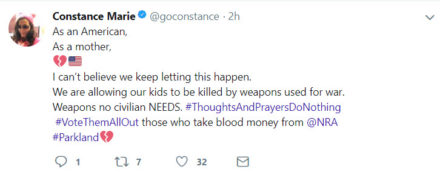
A heavily-armed and deranged 19-year old unleashed hell in Broward County, Florida, on Wednesday. The mass shooting at Marjory Stoneman Douglas High School in Parkland left 17 dead, families devastated, and a school and community forever scarred.
Americans have historically turned to faith and prayer in tragic times such as these. But times are changing. When it comes to mass shootings today, public expressions of sympathy and calls for prayer are increasingly answered with scorn and derision. In the hours following yesterday’s tragedy, thousands of people took to social media denouncing prayer. As of the time of this article, #ThoughtsAndPrayersDoNothing is trending.
It will probably not surprise readers that most of the attacks on “thoughts and prayers” come from the left, particularly those who advocate tougher gun laws as the primary (or exclusive) solution to gun violence. To them, the only appropriate response to a mass shooting is to pass more laws restricting the manufacture, distribution, and ownership of firearms in the United States. The only public expression they will accept is condemnation of the National Rifle Association, Republican politicians, or both. Anything else is meaningless.


To the left, public calls for “thoughts and prayers,” especially those coming from NRA supporters or Republican politicians, are dangerous because they serve as a cheap “cop out” from the hard work of actually reducing gun violence in America.
It’s understandable that Americans want solutions to mass shootings. No one should be satisfied with what happened in Parkland, Florida. No one should willingly embrace mass shootings as the norm. But it’s deeply unfortunate that in our search for solutions, we have turned on each other. Ridiculing prayer as well as people of faith does nothing to make our kids and our communities safer.
As a pastor, I find it both frustrating and heart-breaking that faith-minded Americans are now increasingly under attack when they dare to express their faith on social media, in their communities, or in the public square. This is, after all, the United States of America — a nation founded on Judeo-Christian principles and, for most of its history, committed to religious freedom and welcoming to men and women who openly practiced their faith. And it’s a nation still heavily populated by people who say religion is a major part of their lives. According to a recent Pew Research Center study, 55 percent of Americans pray at least daily, with another 16 percent praying at least weekly. That means prayer is a regular practice for over 70 percent of Americans. That we now have to defend “thoughts and prayers” is surreal and tragic.
The evidence for God’s existence is overwhelming. And contrary to what some say, evil and suffering don’t undermine belief in God. On the contrary, the presence of evil affirms the existence of good. Without good, we’d have no concept of evil. Our visceral revulsion to a gunman murdering 17 people in a high school points to a moral law that defies any Darwinian explanation. We know what happened was evil and tragic. We know it. We know it because our Creator wired that moral awareness into our very soul. You can’t have a moral law without a Moral Lawgiver.
Some of course argue that a God who allows evil, pain, and suffering isn’t worthy of our prayers or worship. While such emotion may, at times, be understandable, the argument itself betrays a narcissistic and naive conception of truth and reality. There are many things that happen in the universe that escape our notice. Other things happen for which we have no explanation or understanding. And others that do not meet with our approval. Our inability to know, understand, or appreciate things, however, does not speak to the reality of those things. God’s existence does not depend on our awareness, knowledge, or approval.
As a Christian pastor, I can say that the Bible provides many answers to the question of why God allows pain and suffering. The Bible is explicit that, in this life, there will be pain and suffering. The Bible is brutally honest that our lives will be, at times, adversely affected by this fallen world as well as by the sins of other people and frankly our own sins.
The bottom line is that what happened yesterday in Florida doesn’t disprove God. It certainly doesn’t disprove the God of the Bible. It merely points to our desperate need for God.
None of this is to suggest that we should only pray. The Bible endorses both prayer and action. When President Theodore Roosevelt took the oath of office at his 1905 inauguration, the Bible upon which he placed his left hand was opened to James 1:22-23, which reads: “But be ye doers of the word, and not hearers only, deceiving your own selves…”
We must not simply speak and hear. We must act — especially when it is within our power to do so. Nevertheless, to act on an issue as important as reducing gun violence in America (especially mass shootings at schools) would be foolish without guidance from above.
Abraham Lincoln once said: “I have been driven many times upon my knees by the overwhelming conviction that I had nowhere else to go. My own wisdom and that of all about me seemed insufficient for that day.”
No matter our passion and sincerity, human wisdom alone will not solve the terrible problem of mass shootings in America. To solve that problem, we need God. And we need each other.
We need prayer.









